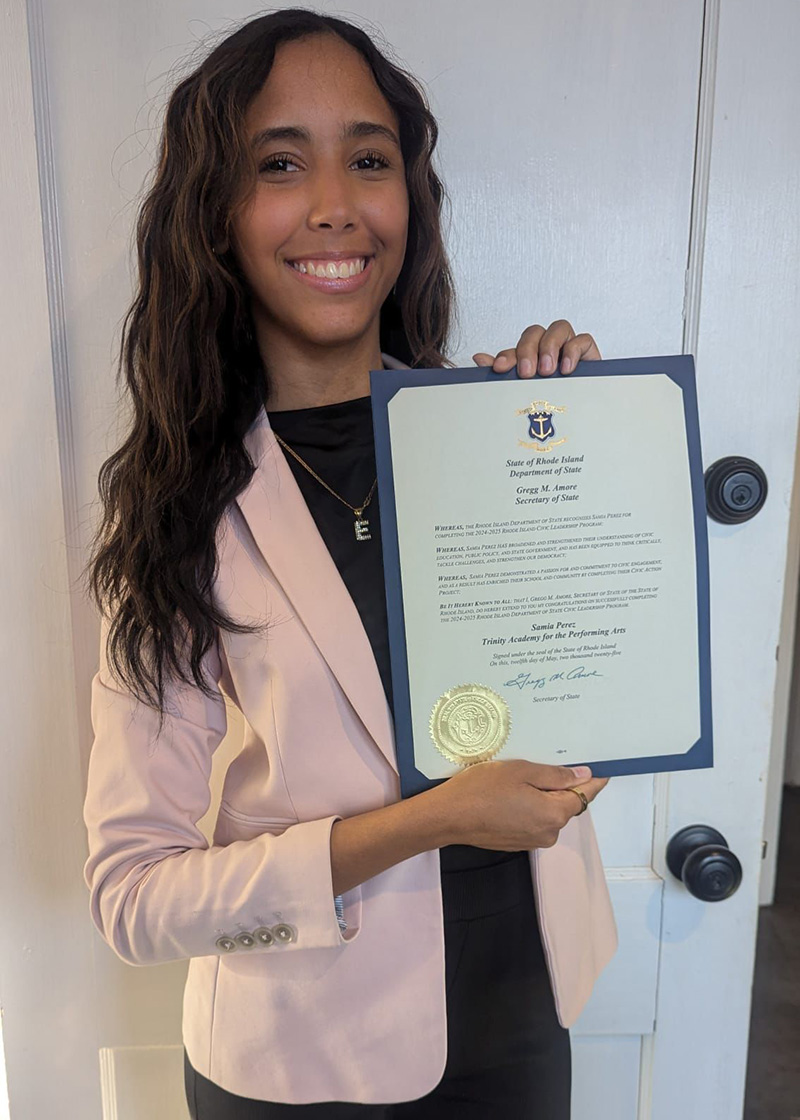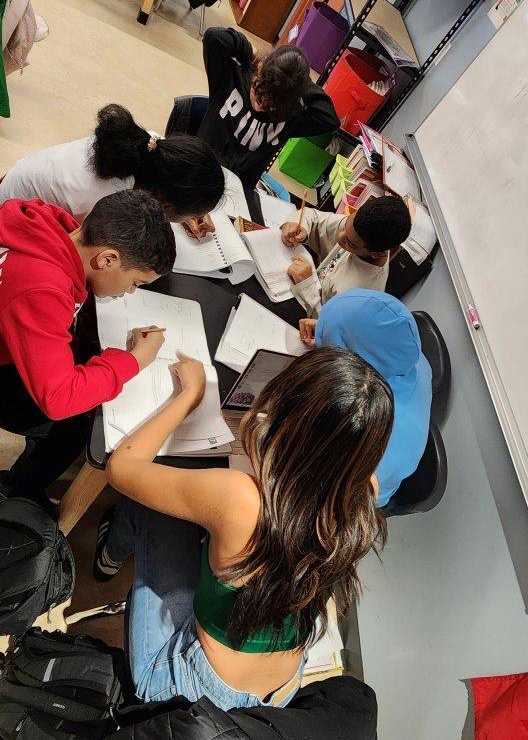Samia P's Action Plan
Action Plan Title: Fuerza Multilingüe: Acción para el Éxito Académico

Samia P.
Hometown/Country: Providence, Rhode Island
Program/Year: Leadership Institute On-Campus (2024)
Describe the need or issue you are trying to address in one or two sentences.
The issue I am addressing is the lack of equitable academic and community support for multilingual learners (MML) at my school and others in Rhode Island. This gap negatively impacts their academic performance, engagement, and overall well-being.
Describe your project in detail, including what steps you've taken to advance your project.
During the summer of 2024, I participated in a pre-college program at Brown University, where I developed a Civic Action Plan titled Multilingual Force: Action for Academic Success. The project was inspired by the inequities I observed at my school, TAPA, where multilingual learners (MML) do not receive the same level of academic and community support as their peers. Drawing from successful models in Boston, I researched effective programs and tailored strategies to fit the needs of my school in Providence.
I presented my plan to teachers, school leaders, and collaborated directly with the Rhode Island Department of Education to initiate changes not only at TAPA but also in other schools across the state. As a result, my school and others will begin implementing new strategies this academic year, including increased support from specialized staff and the creation of inclusive spaces for multilingual students.
To complete my action plan, I graduated from the RI Civic Leadership Program, a milestone that strengthened my growth as a student leader. This experience taught me that student voices matter. I’m proud to have turned a personal concern into meaningful action, and I hope this project marks the beginning of broader efforts toward educational equity in Rhode Island.
What next steps will you take regarding your Action Plan?
While the foundation of my Action Plan is complete, my work is far from over. The next steps involve supporting the implementation of the proposed strategies at my school, such as increasing specialized staff for multilingual learners, offering personalized academic support, and creating inclusive spaces where these students feel seen and heard. I also plan to continue collaborating with the Rhode Island Department of Education to expand the reach of this initiative to other schools in the state.
Additionally, I aim to gather feedback from students and teachers to assess the effectiveness of the changes and make adjustments as needed. I will work with school leaders to organize professional development opportunities that focus on the needs of multilingual students and promote cultural competency among staff.
To maintain momentum, I plan to form a student advisory group made up of multilingual learners, giving them a platform to share their experiences and ideas. My ultimate goal is to help create a sustainable model of support that can be replicated across the state, ensuring all students, regardless of language background, have access to the tools they need to succeed.
How did you get interested in this issue? Why does this issue matter to you and why should it matter to others? What new insight or learning do you have about this issue?
I became interested in this issue after witnessing how multilingual learners at my school struggled due to inadequate support. At the same time, students in nearby cities like Boston had access to stronger programs. As a multilingual student myself, I understood their challenges firsthand. This issue matters to me because every student deserves equal opportunities to succeed, regardless of language background. It should matter to others because educational equity benefits the entire community. Through this project, I’ve learned that systemic change is possible when student voices are heard and that collaboration is key to driving meaningful, lasting improvements.
How have others been involved in your project? What are their respective roles? If you did work with other people, what are the challenges and benefits of working with others? If you've done this project almost entirely on your own, how can you get others involved?
Collaboration played a key role in the success of my Action Plan. I worked closely with teachers, school leaders, and the Rhode Island Department of Education to develop and refine my proposals. Teachers provided valuable insight into the current challenges faced by multilingual learners in the classroom, while school leaders helped me understand the logistical and policy-related aspects of implementing change. The Department of Education offered guidance on how to expand my plan to other schools and ensure it aligned with state initiatives.
One of the greatest benefits of working with others was the collective expertise and support I received. These partnerships gave my project credibility and helped transform ideas into actionable steps. However, coordinating with multiple stakeholders was also a challenge—aligning schedules, navigating differing opinions, and maintaining consistent communication required patience and persistence.
To deepen community involvement, I plan to establish a student-led advisory group that includes multilingual learners, giving them a voice in shaping solutions. I also hope to engage families, community organizations, and local leaders to build a broader coalition for change. By involving more people, we can create a stronger, more inclusive effort that reflects the needs and strengths of the entire school community.
 What Impact do you think your project has had? What impact has you and what impact has it had on others/the issue?
What Impact do you think your project has had? What impact has you and what impact has it had on others/the issue?
My project has had a meaningful impact both within my school and beyond. At TAPA, it sparked important conversations about the needs of multilingual learners and led to the administration taking initial steps to implement new strategies—such as increasing specialized staff and creating more inclusive academic spaces. By working with the Rhode Island Department of Education, I helped lay the groundwork for expanding these changes to other schools across the state, contributing to a broader movement for educational equity.
Personally, this project has transformed me. It strengthened my leadership, communication, and advocacy skills, and most importantly, it showed me that my voice can influence real change. I gained confidence in my ability to take action on issues that matter deeply to me and my community.
For others—especially multilingual students—this project has created new opportunities to be heard and supported. It has shown them that they are not alone and that their success matters. By addressing systemic inequities, this initiative has helped shift the conversation toward inclusion and empowerment, making a lasting impact that I hope will continue to grow in the years to come.
What challenges and obstacles have you experienced and how have you addressed these challenges?
One of the main challenges I faced was convincing school leaders and staff to recognize the urgency of supporting multilingual learners, especially since resources are often limited and priorities vary. Additionally, coordinating meetings and maintaining consistent communication among busy stakeholders was difficult. At times, it was frustrating to see slow progress or encounter resistance to change.
To address these challenges, I focused on building strong relationships based on mutual respect and open dialogue. I gathered data and examples from successful programs in other cities to make a clear, evidence-based case for my proposals. I also remained patient and persistent, celebrating small victories to maintain momentum. By involving teachers, students, and the Department of Education, I created a collaborative network that shared responsibility for moving the project forward, which helped overcome obstacles and build lasting support.
What knowledge or skills did you learned during your BELL/Leadership Institute course you have applied to your work on this project?
During my BELL/Leadership Institute course, I gained valuable skills in leadership, communication, and project planning that were essential to my work on this project. I learned how to identify community issues, research effective solutions, and develop clear, actionable plans. The course taught me how to engage stakeholders through respectful dialogue and collaborative problem-solving, which helped me present my ideas persuasively to school leaders and the Department of Education. Additionally, I developed confidence in public speaking and advocacy, allowing me to effectively share the needs of multilingual learners and rally support. These skills empowered me to lead my project with purpose and professionalism.
What tips and advice would you give to new students as they think about developing their Action Plan?
I actually have many, but I will say the most important ones—the ones that really helped me a lot.
Choose an issue you truly care about. Passion will keep you motivated through challenges.
Do thorough research. Understand the problem deeply and learn from successful examples.
Engage others early. Talk to teachers, peers, and community members to gather ideas and build support.
Be patient and persistent. Change takes time, so celebrate small wins along the way.
Communicate clearly and respectfully. Present your ideas with confidence and be open to feedback.
Stay organized. Keep track of your goals, meetings, and progress to stay focused.
Do everything from your heart, don't do it for your own good.
Use the skills you learn in leadership programs. Apply teamwork, public speaking, and problem-solving skills.
Remember, your voice matters. Don’t underestimate the impact you can have.